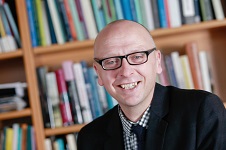 Professor Tony Ballantyne, Pro-Vice-Chancellor, Division of Humanities
Professor Tony Ballantyne, Pro-Vice-Chancellor, Division of Humanities
Postgraduate study has transformative power. Study at an advanced level, whether through coursework programmes or the focused work of researching and writing a dissertation, will not only expand your knowledge, but it will equip you with new methods, skills, and analytical perspectives. If undergraduate study is about developing basic competence in a discipline, postgraduate study is about mastering those tools and deploying them effectively to generate significant new knowledge within your discipline and to create innovative approaches to significant social and scholarly issues.
Postgraduate study transforms your capacity as a student and scholar and, in many cases, it also transforms you as a person. In my own case, postgraduate study at Cambridge not only equipped me with a new set of perspectives on my field of research (British colonialism) but it also greatly enlarged my sense of the world, in particular because of the time I spent in north India undertaking archival research. That Indian experience was vital to my professional development, but it also taught me a great deal about the range of human experience and it stood as a stark counterpoint to the wealth and privilege of Cambridge.
Research a key engine of transformation
Most importantly, postgraduate research is a key engine that transforms all of our academic disciplines. Postgraduates explore new research frontiers, develop new scholarly approaches, and create important new insights as they complete their projects and share their findings. In the process they often teach their supervisors important things and lead their mentors to think in new ways. Through conference presentations and publishing they disseminate their findings and challenge established ideas, enlarging scholarly understanding and pushing others in their discipline to grapple with their arguments. As a senior researcher, one of my greatest pleasures is connecting younger scholars with leading publishers to ensure that their work gets out into the world and has the maximum impact.
The research conducted by postgraduate researchers can have significant transformative power in the world beyond the academy as well. Insightful and engaged research can shift popular understanding, reshape social relationships, and enhance our communities and society as a whole. An outstanding example of this kind of work is the recent Otago PhD in History by Jane McCabe. Jane's research reconstructed the operation and assessed the significance of a scheme that resettled mixed race adolescents from northeast India in New Zealand during the first half of the twentieth century. While it was an cutting-edge piece of academic work that illuminated how empire, race and migration worked, Jane's research also created a host of new connections amongst the descendants of those migrants in New Zealand and helped them to make sense of the dislocations and challenges that shaped the live experiences of their ancestors. Jane built a strong profile for her research on the internet and in the media and through this was able to assist several descendants to fill in missing pieces of their family history and to begin to reconnect with their lost Indian heritage. Her work is an outstanding example of the difference that postgraduate research can make in people's lives and in their sense of themselves.
It is the transformative power of postgraduate research that makes it such an exciting prospect. And the University of Otago is an outstanding institution in which you can explore these life-changing possibilities.
Pro-Vice-Chancellor, Division of Humanities, Professor Tony Ballantyne
